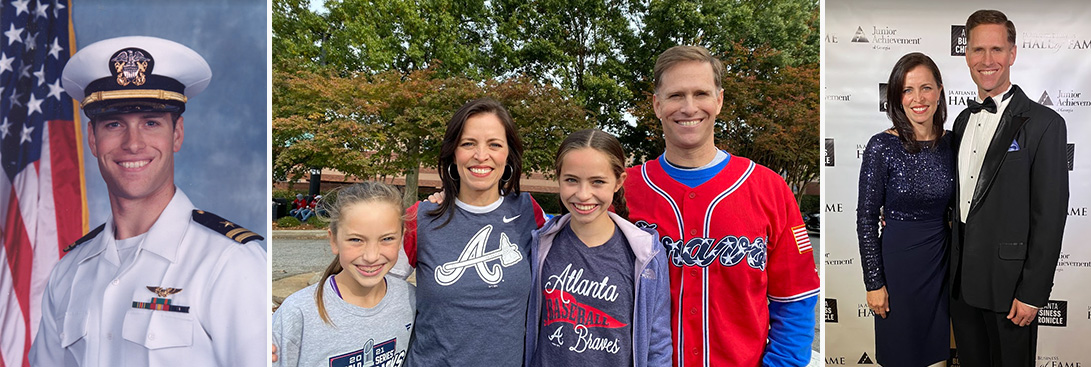Cresa is committed to building an inclusive workplace that encourages, supports, and celebrates the diverse voices of our employees. Our employee spotlight series gives our team members the opportunity to share their unique experience.
Jason leads Cresa Hybrid Workforce Services and Cresa Business Technology Sourcing. Hybrid Workforce Services helps clients navigate all of the critical requirements of a balanced hybrid work strategy including human resources, operations, technology, compliance, finance and real estate. Business Technology Sourcing helps companies select and implement technology such as unified communications, internet, call center, cybersecurity, and cloud computing. Jason helps clients select and implement the cutting edge solutions that support their specific business needs and ensures coordination between the real estate and IT departments, especially when relocating. Both service lines accelerate performance, improve talent attraction/retention, and maximize financial results.
Left: Lieutenant Jones – circa 1995
Center: Margaret Anne (11), Natalie (wife), Suzanne (13) at Braves World Series parade (2021)
Right: With his wife Natalie at Junior Achievement of Georgia annual gala (2022)
What is your Name, Office, and position at Cresa?
Jason Jones, Managing Principal, Cresa Business Technology SourcingHow long have you worked at Cresa?
19 yearsHow did you get into the industry?
After serving in the Navy and traveling the world for a little over one year, it was time to find a career that I could lean into for the long haul. In the spring of 2002, not long after 9/11 and the dot-com bust I started my job search. I had a hunch that commercial real estate was the right place for me but needed to confirm my feeling. Because no one was hiring during the poor economy, I had coffee, lunch and informational interviews with 90 people before getting a job offer. The experience painted a very clear picture of several job descriptions. The 90th interview was with Billy Hobbs who was a partner at Trammel Crow Company. After speaking for 45 minutes, thankfully he “went with his gut” and hired me on the spot. We have been partners ever since.How would you define your real estate practice?
I am an odd duck in the commercial real estate industry in that I no longer practice traditional commercial real estate anymore. Instead, I lead a technology service line for Cresa called “Business Technology Sourcing”. We help clients of Cresa find and negotiate the best deals on cutting edge business technology needs such as Unified Communications (voice, text, instant message), Cloud computing, and Internet service, especially when relocating. We solve two key problems:
- understanding and deciding on the right communications technologies that support the workforce (e.g., voice, Internet, etc.) - whether working from home or the office, and
- we help coordinate these technologies with the real estate process to ensure our clients are up and running on Day 1.
Please describe your military experience.
I enrolled in Navy ROTC at Duke University, which is how I got my commission as an officer in the Navy. Upon graduation I went to flight school in Pensacola, FL where I selected A-6 Intruders as a Bombardier/Navigator. That took me to Naval Air Station Oceana in Virginia Beach, VA where I learned to operate the weapons systems and navigation system of the Intruder before being assigned to an operational “fleet” squadron for 2 years. I flew aboard the USS Enterprise and deployed to the Mediterranean Sea and Persian Gulf.
The A-6 Intruder is a two-seat attack jet known for its heavy payload, the ability to ingress to the target at low-altitude and at night, and its ability to hit targets in any type of weather. We didn’t need to see the target visually because the Bombardier/Navigator could use the plane’s ground-mapping radar to find it instead. Flying low and fast through the mountains and coming in from the sea to land was very exciting. And doing it with a good friend sitting right beside you was a ton of fun. Aircraft carrier operations are challenging, yet highly rewarding.
What unique perspective has your military experience given you?
Serving in the U.S. military provided a unique perspective on the role the United States in global diplomacy, power projection and protecting freedom of the sea and air. I remember conducting operations off the coast of Libya where we flew our jets into contested airspace near the Gulf of Sidra, just to make the point that it was international airspace, not Libyan airspace as Muamar Gaddafi claimed. This is important for maintaining the freedom of all aircraft and vessels to traverse the airspace and waters of the world since failing to do so allows precedent to be set that others will take advantage of.
What aspect of your military training serves you well in real estate?
Naval aviation made me detail-oriented, process-driven and mission focused. These attributes have served me well in real estate, and especially as a technology advisor. Aviation is all about checklists and paying attention to details that could cost you dearly. For example, on an attack jet if you set the inter-bomb release timing too short you could risk a bomb-to-bomb explosion right underneath your aircraft. Not good! And of course, accomplishing missions as a team is central to military operations. I thrive on teamwork and the Navy planted those seeds deeply.
What organization(s) outside of Cresa are you currently involved with?
I sit on two non-profit boards: The Georgia Center for Opportunity and Junior Achievement of Georgia. The Georgia Center for Opportunity focuses on helping all people – no matter their race, past mistakes, or circumstances of their birth – have access to quality education, fulfilling work and a healthy family life. Junior Achievement of Georgia arms K-12 students with financial literacy, career readiness and fosters the entrepreneurial spirit.
How and why did you become involved with this organization?
It was the education component that got me interested. I am a strong believer that many of the struggles our fellow citizens face are rooted in education. If we can improve our quality and access to educational environments that fit each individual the best and encourage parents to prioritize education, especially at the K-12 level, I believe we will dramatically improve physical health, mental health, economic success and family stability – which lead to greater well-being for all.
What has your involvement with this organization taught you?
I have learned the power of volunteers coming together to invest their time and treasure in making a difference in the lives of others. I have also learned the possibilities of partnering with government entities (e.g., school systems), in addition to the importance of lobbying efforts to make policy changes at the state level that have a positive downstream effect on children.
How do you think we can better promote DIB within the CRE industry?
Diversity and inclusion in an organization do not happen by accident. It requires intentionality. I learned the importance of intentionality during my final two years in the Navy as a healthcare programs recruiter, focusing our attention on diversity when filling open billets. I believe that what Cresa is doing to promote DIB is a shining example of how to put it on the forefront of our collective consciousness. The key for us is to stay consistent, focus on recruiting a diverse workforce, and create leadership opportunities that showcase our growing diversity so that everyone can clearly see that we value the inclusion and belonging of people who are like themselves.
Other – if there is anything else you would like to share, please include your final comments here.
Yes – I want to encourage everyone to consider international travel to broaden their perspective and increase their familiarity with different cultures, races and ethnicities.
In 2000 I left the United States on a backpacking tour of the world about which I wrote a book “Nomad: Letters from a Westward Lap of the World”. The trip led me through 25 countries over 15 months. I stayed with local families, learned Spanish, studied world religions, and ultimately decided to place my faith in Jesus Christ. Because I traveled alone much of the time, I routinely found myself in environments where I was the only white person, which forced opportunities to connect with and receive help from people who were very different from me. As one example, I once experienced the kindness of an Indian man sitting on the opposite overhead luggage rack of an overnight train. We could not speak each other’s language, but he could see that I was thin and very hungry and had no food for the long trip. His heart took pity and he decided to share half of his only piece of naan, giving me his last bit of food. I will never forget his generosity and self-sacrifice!
International experiences will open one’s heart and mind to actively seek the enriching benefits of Diversity, Inclusion and Belonging.



